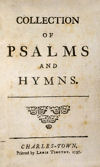10 Things You Probably Didn't Know about "Hark! The Herald Angels Sing"
First appeared in The Baptist Bulletin, December, 2007
1. The original song was published as “Hark, How All the Welkin Rings” in the 1739 Wesley hymnal, Hymns and Sacred Poems. The second line, as written by Charles Wesley, read “Glory to the King of kings,” not “Glory to the newborn King.” And he originally wrote “Universal nature say,” not “Sons of men and angels sing.”
2. “Welkin” is an old English word for “the expanse of the heavens.” Chaucer used it in The Canterbury Tales: “This day in mirth and revel to dispend, / Till on the welkin shone the starres bright.” It is likely that “welkin” was becoming obsolete even when Wesley used it in 1739.
3. The change from “welkin” to “herald angels” was made by none other than George Whitfield. Ironically, he also changed the meaning of Wesley’s metaphor. What was once a hymn about Heaven’s response to God became a hymn about humanity’s response to God’s redemption.
4. The Wesleys weren’t too happy when people changed the words of their songs. In the preface to the 1780 edition of Hymns and Sacred Poems, John Wesley said, “Many gentlemen have done my brother and me (though without naming us) the honour to reprint many of our Hymns. Now they are perfectly welcome so to do, provided they print them just as they are. But I desire they would not attempt to mend them; for they really are not able. None of them is able to mend either the sense or the verse. Therefore, I must beg of them one of these two favours; either to let them stand just as they are, to take them for better or worse; or to add the true reading in the margin, or at the bottom of the page; that we may no longer be accountable either for the nonsense or for the doggerel of other men.”
5. Charles Wesley originally intended this hymn to be sung to the same tune as his Easter hymn “Christ the Lord Is Risen Today.” Sure enough, the words to “Hark the Herald” perfectly fit the tune EASTER HYMN. This is an intriguing idea. In Wesley’s mind, Christ’s birth was inexplicably connected to His death and resurrection—a point Wesley wanted to clarify by using the same tune for both songs.
6. The tune we usually associate with “Hark! The Herald” was written by Felix Mendelssohn in 1840—and it was not intended as a sacred song. Mendelssohn wrote it to commemorate the four hundredth anniversary of Gutengberg’s printing press (No. 2 “Vaterland, in deinen Gauen” from Festgesang zum Gutenbergfest). It was first sung by two hundred men, accompanied by two brass bands on either side of the town square, as a new Gutenberg statue was unveiled in Leipzig, Germany.
7. Mendelssohn immediately sensed his tune would be successful, but he never thought it was suitable for the church, saying, “If the right words are hit at, I am sure that piece will be liked very much by the singers and the hearers, but it will never do to sacred words. There must be a national and merry subject found out, something to which the soldierlike and buxom motion of the piece has some relation.”
8. So it is with some irony that the text was edited against the author’s wishes and combined with a tune the composer felt was unsuited for church! The version we know as “Hark! The Herald” was first published with altered text and tune in 1857.
9. Charles Wesley always considered himself an Anglican, and the hymn is still used every year for “The Festival of Nine Lessons and Carols” at Kings College, Cambridge.
10. Wesley’s carol made a famous television appearance in 1965, serving as the climax to A Charlie Brown Christmas. While this was probably the first and last time a network television show will present the song in its true context of Luke 2, it has not exactly slipped from our national conscience. Currently 150 versions of it are available for download on iTunes.
Hark, How All the Welkin Rings:
A Hymn for Christmas Day
[Original version, 1739]
1. Hark, how all the welkin rings,
“Glory to the King of kings;
Peace on earth, and mercy mild,
God and sinners reconcil’d!”
2. Joyful, all ye nations, rise,
Join the triumph of the skies;
Universal nature say,
“Christ the Lord is born to-day!”
3. Christ, by highest Heaven ador’d,
Christ, the everlasting Lord:
Late in time behold him come,
Offspring of a virgin’s womb!
4. Veil’d in flesh, the Godhead see,
Hail th’ incarnate Deity!
Pleas’d as man with men to appear,
Jesus, our Immanuel here!
5. Hail, the heavenly Prince of Peace,
Hail, the Sun of Righteousness!
Light and life to all he brings,
Risen with healing in his wings.
6. Mild he lays his glory by,
Born that man no more may die;
Born to raise the sons of earth;
Born to give them second birth.
7. Come, desire of nations, come,
Fix in us thy humble home;
Rise, the woman’s conquering seed,
Bruise in us the serpent’s head.
8. Now display thy saving power,
Ruin’d nature now restore;
Now in mystic union join
Thine to ours, and ours to thine.
9. Adam’s likeness, Lord, efface,
Stamp thy image in its place.
Second Adam from above,
Reinstate us in thy love.
10. Let us thee, though lost, regain,
Thee, the life, the inner man:
O, to all thyself impart,
Form’d in each believing heart.
- 45 views
Jeff Brown



Discussion